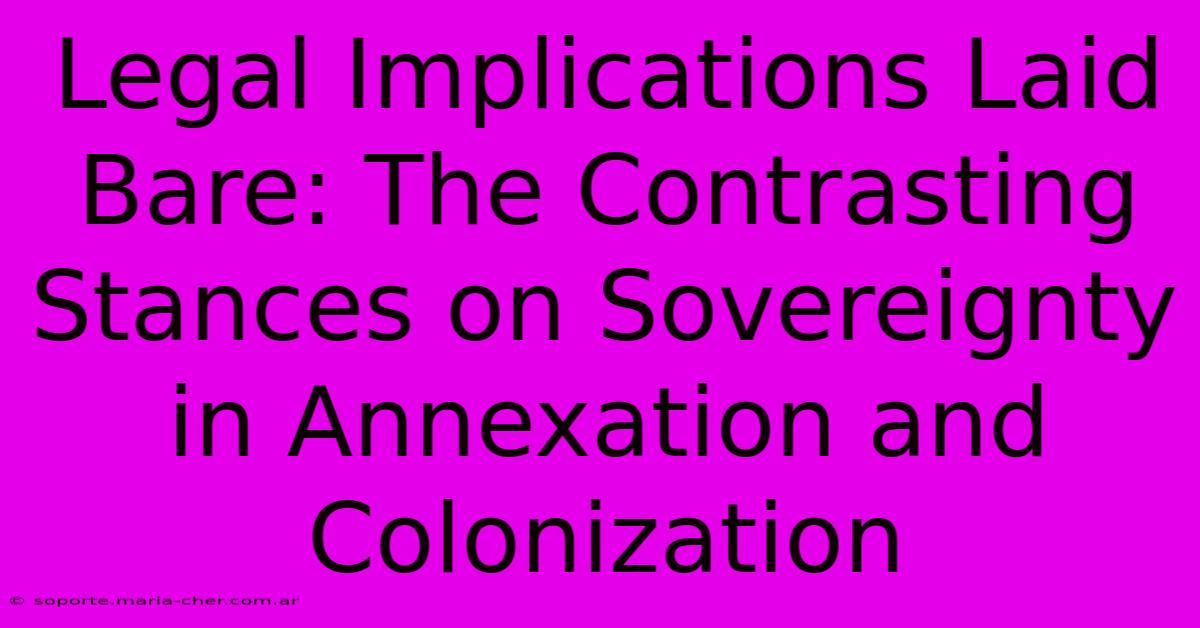Legal Implications Laid Bare: The Contrasting Stances On Sovereignty In Annexation And Colonization

Table of Contents
Legal Implications Laid Bare: The Contrasting Stances on Sovereignty in Annexation and Colonization
The concepts of annexation and colonization, while both involving the acquisition of territory by a state, differ significantly in their legal implications, particularly concerning sovereignty. Understanding these distinctions requires careful examination of international law and its evolving interpretations. This article delves into the core differences, highlighting the legal arguments surrounding sovereignty in each context.
Annexation: A Contested Claim of Sovereignty
Annexation, in its simplest form, is the formal acquisition of territory by a state, typically through a claim of de jure or de facto control. However, the legality of annexation hinges crucially on the circumstances surrounding the acquisition. International law, primarily enshrined in the UN Charter, generally prohibits the acquisition of territory by force. This principle, solidified through numerous resolutions and case law, renders annexations achieved through military conquest or coercion largely illegitimate under international law.
Legitimate Annexation: Rare Exceptions
While forceful annexation is widely condemned, there are limited exceptions. These exceptions typically involve:
- Cession: The voluntary transfer of territory from one state to another, usually through a treaty. This requires the free and informed consent of the ceding state, a requirement often debated and contested.
- Accretion: The gradual addition of land through natural processes, such as the slow build-up of sediment. This is a relatively straightforward case of territorial acquisition.
- Prescription: The acquisition of territory through long-term, undisputed possession. This requires prolonged, peaceful control, often decades, and acceptance by the international community – a difficult bar to meet.
The key element in any legitimate annexation is the absence of coercion and the presence of consent, either from the previous holder of sovereignty or through established legal processes. Any claim lacking these elements will likely face international condemnation and potential legal challenges.
Colonization: A Legacy of Unequal Power Dynamics
Colonization, historically, involved the subjugation of indigenous populations and the appropriation of their land and resources by a foreign power. Unlike annexation, which at least purports to transfer sovereignty, colonization fundamentally denies indigenous sovereignty. The colonial powers often imposed their own legal and administrative systems, ignoring or suppressing existing indigenous governance structures.
The End of Colonialism and its Lingering Impact
The post-World War II era saw a widespread rejection of colonialism, culminating in the decolonization movements that led to the independence of numerous countries. The UN Charter and subsequent international human rights instruments explicitly condemn colonialism and emphasize the right of self-determination for all peoples. This principle underpins the illegitimacy of colonial practices under modern international law.
However, the legacy of colonization continues to cast a long shadow. Many former colonies face ongoing challenges related to land rights, resource control, and political stability – all stemming from the historical denial of indigenous sovereignty. These lingering issues frequently fuel ongoing legal and political disputes.
Contrasting Sovereignty Claims: A Clear Divide
The central difference between annexation and colonization lies in the treatment of pre-existing sovereignty. Annexation, when legitimate, ostensibly transfers sovereignty. While the legitimacy of many historical annexations is highly questionable, the aspiration is a transfer of authority. Colonization, on the other hand, actively denies and suppresses pre-existing sovereignty, imposing external rule without the consent of the indigenous population. This fundamental difference shapes the legal and ethical considerations surrounding each.
Conclusion: The Ongoing Relevance of Sovereignty
The legal debate surrounding sovereignty in annexation and colonization remains highly relevant today. Disputes over territorial claims and the impact of past colonial practices continue to generate significant international tension. Understanding the distinct legal frameworks and the evolving principles of international law is critical for navigating these complex issues and promoting a world based on respect for sovereignty and self-determination. The continued focus on international human rights and the principles enshrined in the UN Charter remains essential in addressing the lingering consequences of historical injustices and ensuring future actions are aligned with international law.

Thank you for visiting our website wich cover about Legal Implications Laid Bare: The Contrasting Stances On Sovereignty In Annexation And Colonization. We hope the information provided has been useful to you. Feel free to contact us if you have any questions or need further assistance. See you next time and dont miss to bookmark.
Featured Posts
-
Bokeh Heaven Viltrox Fe 20mm F2 8 Creates Dreamy Background Blur For Stunning Portraits
Feb 04, 2025
-
Timberwolves Vs Pistons The Ultimate Stats Showdown
Feb 04, 2025
-
Elevate Your Greetings Stunning New Years Cards For A Memorable 2023
Feb 04, 2025
-
Shimmering Success The Business Card That Sets You Apart
Feb 04, 2025
-
Unveiling The Mysterious Reason Why Is The Bulls Logo Upside Down
Feb 04, 2025
